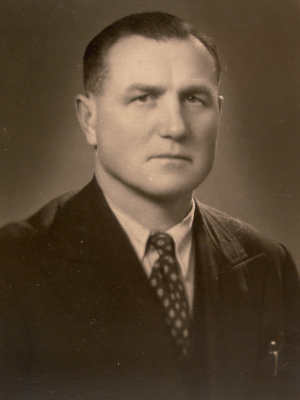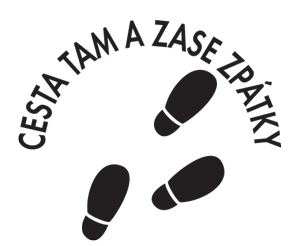František Šesták - Partisan and Political Prisoner of the Fifties.
 He was born on February 22, 1903 in Míkovice near Uherské Hradiště. His father Jan had to go to the frontline of the First World War. František as the oldest son had to také up his father's duties at home; he worked with the plough when he was 10 and knew famine as a child (crop failures, droughts and heavy rainpoors). He had 4 younger brothers, he could not study himself but he supported two of his brothers on their studies. In 1933, he married Antonie Krausová whom he met as a driver of a small bus delivering mail to villages. With her he had two duaghters, Anna (bord 193č) and eight years younger Jana (born 1942).
He was born on February 22, 1903 in Míkovice near Uherské Hradiště. His father Jan had to go to the frontline of the First World War. František as the oldest son had to také up his father's duties at home; he worked with the plough when he was 10 and knew famine as a child (crop failures, droughts and heavy rainpoors). He had 4 younger brothers, he could not study himself but he supported two of his brothers on their studies. In 1933, he married Antonie Krausová whom he met as a driver of a small bus delivering mail to villages. With her he had two duaghters, Anna (bord 193č) and eight years younger Jana (born 1942).
On the Verge of Death
After the February coup of 1948, while he was writing anti-communist slogans on the road across Podolí, he was shot by bullets of three militiamen (armed workers who guarded for example factories = People's Militias – people manipulated agains democracy, thinking tha they were doing good things). Despite his injuries, he managed to run away unrecognised from the crime scene. He was secretly transported to Brno to his brother Jan where he was cured by friendly doctor using at that time almost inaccessible penicillin.
His Brother's Escape Aboard
His brother Josef was awarded the French War Cross for fighting in France. When he returned to Czechoslovakia in 1946 with the rank of a major of the French army, he was assigned to the garrison in Milovice. His rank of major was not confirmed and they offered him education in the spirit of communist ideology. Because of that, he decided to return to France, where he had many good friends (general de Gaulle). His brother František helped him illegally cross the border, having many trustworthy friends from the anti-fascist resistance who trusted him. Thanks to this, he eanred where his brother could safely cross. He could have escaped as well but he remained with his family. These things were arranged in secret because any disclosure would lead to an arrest of everyone who had something do to with them. „We were not told about it. They were meeting late in the night when we were sleeping. Only my sister, when the noise when they arrived woke her, watched and listened through a little window with a curtain in the door,“ recalls Jana vozárová. „I don't know about the place of the crossing, these things were secret. Maybe my uncle (Josef Šesták), when he helped transport lumber in Lopeník (local mountains), said, looking around: „This would be a good place for escaping.“
Trial
Unfortunately, František Šesták was arrested on December 23, 1950, since they could accuse him of his brother's escape abroad. Before the trial, they transported him and other „participants“ to the nearest prison in Uherské Hradiště. From Uherské Hradiště, František was shortly afterwards transported to Brno where he was in custody with other prisoners from which a counter-state group was being formed. Using brutal investigating methods, they forced them to confess to counter-state activity. They were forced to sign investigation protocols and memorise answers to questions they were to be asked at court from them. The entire trial was constructed and not public because the public could have doubts. He was sentenced to five year of prison for „high treason“ (Article K231) and for helping his brother Josef escaping abroad. He was sent to a labour camp in Ostrov near Karlovy Vary.
The Uranium Mines
The life in the Jáchymov prisons was very hard. No enough food, cruel colds, strict work norms.
Visits
The were unfortunately very limited. The family had to have a permit where the number of family members was usually limited. Jana Vozárová (née Šestáková) wisited her father with her mother only once. Her eight years older sister stayed at home because the journey to Jáchymov for two adults would be too costly for the family.
„After a long, almost the entire day, journey with several tranfers and waiting for the next train, we arrived to Horní Slavkov. There, we spent the night in the appartment of a family of a station worker who worked with Father. On the second day, buses took us to the prison. The visit took place in a low, quickly constructed wooden „barrack“, still smelling of fresh wood. The building was split across by a double woden barrier with little windows on one side. There were only wooden benches for the visits. A guard brought the prisoner througha narrow corridor to one of the windows and a family came from the waiting area for a 20 minutes long talk. The windows were not yet barred, so the prisoner could shake hands and exchange kisses with his family,“ recalls Jana Vozárová.
He was release on parole after 2.5 years in 1953 during the first amnesty, with the threat of returning to prison if he informs his friends about his time spent there.
The Unsuccessful Founding of an Agricultural Cooperative
In 1950, there was a first attempt to establish a cooperative in Míkovice. However, only landless people without any fields of their own, joined. Farmers who had fields, horses, tools and, last but not least, know-how, refused to enter. The farmers „spat on the kolzoch workers and laughed at their small abilities and effort,“ remembers B. Pipal, one of the founders. However, the cooperative fell apart since its only workers did not know how to farm.
The pressure on citizens to enter the cooperative was applied in different ways: „Antonín B., Míkovice no. 152, requests an extension of his husting permit. The council has unanimously agreed to extend the permit from January 1, 1953, provided that the petitioner enters the IAC and actively participates in the construction.“ Or, in 1952, the case of Ms. K., who brought milk that was already skimmed, to a collection point. „After considering all circumstances, the council has unanimously agreed upon council member S.A.'s suggestion of confiscation of the milk skimmer, a fine of CSK 5.000 and an announcement in local public address system.
The second attempt of establishing the cooperative took place in 1953, this time it was a collectivisation without voluntariness. In the Míkovice chronicle, PhDr. Antonín Š. Wrote: „... the first mistake was that the principle of absolute voluntariness was not applied and kept.“ Since the value of the produced goods was lower than the expenses, the business was in loss and the cooperative fell apart again.
With heavy pressure by the state's power, a third attempt took place in 1958. The public address systém kept announcing for days that those refusing to join the IAC are to come to the National Commitee immediately. If they did not come, the persuading commissions went into homes, the officials sat for hours and hours, persuading and threatening. Unfortunately, everyone joined in the end, knowing that resistance would be futile (according to the book of Míkovice).
Conclusion
He was given a pension of CSK 99 (having been refused a war victim's pension). When he appealed agains this decision, he was told he had daughters who had adequate provisions to take care of their father. His fight for a better and just democratic order was not fulfilled – he died aged 61 in 1962 because of a heart illness. He did not even live to see the Prague Spring.


 He was born on February 22, 1903 in Míkovice near Uherské Hradiště. His father Jan had to go to the frontline of the First World War. František as the oldest son had to také up his father's duties at home; he worked with the plough when he was 10 and knew famine as a child (crop failures, droughts and heavy rainpoors). He had 4 younger brothers, he could not study himself but he supported two of his brothers on their studies. In 1933, he married Antonie Krausová whom he met as a driver of a small bus delivering mail to villages. With her he had two duaghters, Anna (bord 193č) and eight years younger Jana (born 1942).
He was born on February 22, 1903 in Míkovice near Uherské Hradiště. His father Jan had to go to the frontline of the First World War. František as the oldest son had to také up his father's duties at home; he worked with the plough when he was 10 and knew famine as a child (crop failures, droughts and heavy rainpoors). He had 4 younger brothers, he could not study himself but he supported two of his brothers on their studies. In 1933, he married Antonie Krausová whom he met as a driver of a small bus delivering mail to villages. With her he had two duaghters, Anna (bord 193č) and eight years younger Jana (born 1942).
































